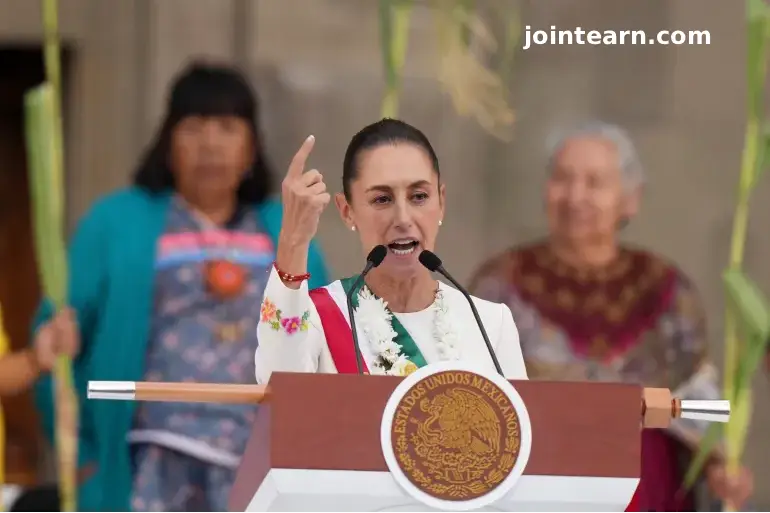
Peru Bars Mexico’s President Claudia Sheinbaum Amid Asylum Dispute
Peru’s Congress has voted to ban Mexican President Claudia Sheinbaum from entering the country, declaring her persona non grata after Mexico granted political asylum to former Peruvian Prime Minister Betssy Chavez.
The decision deepens a rapidly escalating diplomatic conflict between the two Latin American nations, which has already led Peru to sever diplomatic relations with Mexico earlier this week.
In a 63 to 34 vote on Thursday, Peru’s Congress supported the symbolic measure, accusing Sheinbaum’s government of “interfering in Peru’s internal affairs” after allowing Chavez to take refuge inside Mexico’s embassy in Lima.
Peru’s Congress Moves to Defend Its Sovereignty
The declaration of persona non grata — a term usually reserved for foreign diplomats — serves as a formal diplomatic rebuke and prohibits the targeted individual from entering the country.
Fernando Rospigliosi, President of Peru’s Congress, said the vote reflected “support for the government’s decision to break ties with Mexico”, according to El País.
During heated parliamentary debates, Ernesto Bustamante, a member of Peru’s Foreign Relations Committee, launched strong accusations against the Mexican president.
“We cannot allow someone like that, who is in cahoots with drug traffickers and who distracts her people from the real problems they should be addressing, to get involved in Peruvian affairs,” Bustamante said.
The Asylum Controversy: Mexico Grants Refuge to Former PM Betssy Chavez
The diplomatic crisis erupted after Betssy Chavez, who served as Peru’s Prime Minister under former President Pedro Castillo, sought asylum in the Mexican embassy in Lima earlier this week.
Chavez faces charges of rebellion and conspiracy for her alleged involvement in Castillo’s failed 2022 attempt to dissolve Peru’s Congress, a move widely regarded as an attempted coup.
The former prime minister, who could face up to 25 years in prison if convicted, maintains her innocence. She was detained from June 2023 to September 2025 before being released on bail pending trial.
Peru’s Foreign Minister Hugo de Zela condemned Mexico’s decision to grant asylum as “an unfriendly act”, claiming it violated Peru’s sovereignty and international diplomatic norms.
“Mexico’s government has interfered in the internal affairs of Peru,” de Zela said, confirming that safe passage for Chavez to leave the embassy has not yet been granted.
Mexico Defends Its Position, Citing International Law
In response, Mexico’s Ministry of Foreign Affairs defended the decision, insisting it was consistent with international law and humanitarian principles.
The ministry said in a statement that the move “in no way constitutes an intervention in Peru’s internal affairs” and reaffirmed its commitment to protecting individuals facing political persecution.
President Claudia Sheinbaum, who succeeded Andrés Manuel López Obrador (AMLO) in 2024, has positioned herself as a champion of Latin American solidarity, maintaining Mexico’s long tradition of offering asylum to political figures in the region.
Who Is Betssy Chavez and Why Is She Controversial?
Betssy Chavez briefly served as Peru’s Prime Minister from November to December 2022, during the final days of President Pedro Castillo’s administration.
Castillo, a left-wing leader from rural Cajamarca, attempted to dissolve Congress amid corruption investigations and rising political pressure. Within hours, he was impeached, arrested, and later charged with rebellion.
Chavez has been accused of supporting the failed coup, though she has repeatedly denied wrongdoing, claiming she is being politically persecuted by Peru’s conservative establishment.
“I have always defended democracy and the Peruvian people. I am not a criminal,” Chavez said in a statement released by her legal team earlier this week.
A History of Diplomatic Friction Between Peru and Mexico
This is not the first time that Peru and Mexico’s relations have soured over political asylum and comments on internal affairs.
In 2022 and 2023, then-President López Obrador angered Lima by openly supporting Pedro Castillo after his ouster and refusing to recognize the legitimacy of Peru’s current government under President Dina Boluarte.
That standoff led Peru to expel Mexico’s ambassador and temporarily suspend diplomatic relations — a rupture that has now reignited under Sheinbaum’s leadership.
Political analysts say the latest fallout could have regional implications, straining Mexico’s ties with other conservative-led governments in South America that view Sheinbaum’s leftist policies with suspicion.
What Happens Next?
While the “persona non grata” designation is largely symbolic, it underscores deepening tensions and mutual mistrust between the two countries.
Without diplomatic ties, both nations will now rely on third-party intermediaries, likely through regional organizations such as the OAS or CELAC, to maintain limited communication.
Meanwhile, Chavez remains inside the Mexican embassy in Lima, awaiting a possible agreement on safe passage to Mexico — a decision that could further inflame the dispute.
Regional and International Reactions
Other Latin American governments have remained cautious in their response, though several regional analysts have warned that the situation could set a precedent for future asylum-related conflicts.
The United Nations High Commissioner for Refugees (UNHCR) reiterated that granting political asylum is a protected right under international law, but emphasized that host countries must ensure such actions do not endanger diplomatic stability.
Observers suggest that Mexico’s stance could inspire other left-leaning governments in the region to adopt similar policies of political protection, potentially increasing friction with conservative administrations.
Conclusion: A Diplomatic Standoff With No Easy Resolution
The Peru–Mexico diplomatic rift highlights the fragile political landscape in Latin America, where ideological divides often spill over into foreign policy confrontations.
With both sides standing firm — Peru defending its sovereignty and Mexico upholding its asylum tradition — the standoff shows no sign of easing.
Until a compromise is reached, the fate of Betssy Chavez and the future of Peru–Mexico relations remain uncertain.


Leave a Reply